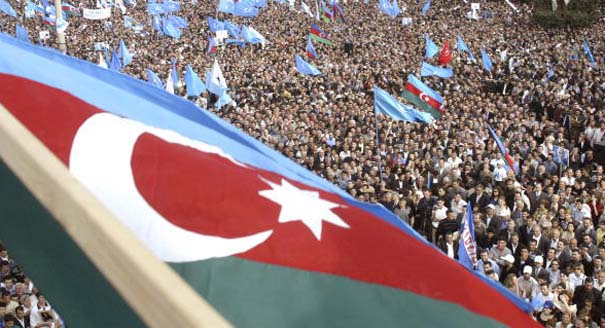The trove of documents published last week by the International Consortium of Investigative Journalists (ICIJ), an anticorruption network, offers a fascinating insight into how the rich avoid taxes.
The papers have received wide coverage in the Western media, but not in semidemocratic or authoritarian countries such as Russia and Azerbaijan. The ICIJ had gone into great detail about how top officials from both regimes have squirreled away money in secretive offshore accounts.
Media attention for the ICIJ files is something that neither the Russian president, Vladimir Putin, nor his Azeri counterpart, Ilham Aliyev, wants. After all, the documents reveal how, over the years, both leaders have constructed a tightly controlled and corrupt system that lacks transparency, accountability, and independent legal controls.
The two leaders have other things in common. Both are clamping down hard on NGOs so as to maintain their grip on power. They are also highly critical of the Organization for Security and Cooperation in Europe (OSCE), which, among other things, monitors elections.
And both have built their economies on energy, convinced that Western investors and politicians will turn a blind eye to human rights violations in order to gain access to such resources.
This is exactly what has been happening in the Council of Europe, a non-EU body promoting cooperation between all European nations.
The Council of Europe was the organization that the countries of Central and Eastern Europe and the former Soviet Union yearned to join after the collapse of Communism in 1989. Membership of the council confirmed that these states had embraced democratic values.
But ever since Russia and Azerbaijan joined, in 1996 and 2001 respectively, they have done everything possible to weaken the Council of Europe from within by derailing criticism of their human rights records. They have often received support from several other council delegations, including those of Spain, Turkey, the UK, France, Hungary, and Poland.
Christoph Strässer, a German Social Democrat lawmaker and rapporteur on political prisoners in Azerbaijan for the council’s parliamentary assembly, says he is disgusted about what is happening.
He argues that parliamentarians who defend Azerbaijan without hesitation are often invited to lavish trips to the country. European firms in the pay of President Aliyev’s regime also lobby intensively in Strasbourg, the Council of Europe’s headquarters.
When Strässer recently asked the parliamentary assembly to vote on Azerbaijan’s human rights record, he was defeated. “We could not defend our values,” he told Carnegie Europe.
Robert Walter, a British Conservative parliamentarian, said during the debate: “Sadly, the rapporteur, Mr. Strässer, who is passionate about this issue, has not visited prisons and prisoners in Azerbaijan.”
How could he? “Despite many requests, the Azeri regime never granted me a visa,” Strässer said. Strässer, who has had the support of the German government and opposition, believes the Council of Europe’s credibility is being damaged from within.
This is an important lesson for the EU, too.
If the EU and the Council of Europe are meant to represent Europe’s democratic values, what happens when those values are undermined by a member state?
The EU suffers from numerous examples of its own, from the unending corruption in Romania and Bulgaria and interference in the judiciary in Hungary, to the abuse of the Roma in the Czech Republic and Slovakia. None of these cases are on the scale of abuses in Azerbaijan or Russia, but they are harmful enough.
Ideally, Strässer would welcome sanctions against these countries. “But you would never get unanimous support for that,” he added.
Strässer and many NGOs believe that the EU could be much more critical toward Azerbaijan, which, after all, is seeking closer ties to Brussels through the EU’s Neighborhood Policy, and toward Russia, which wants visa-free travel for its citizens.
The EU, the Council of Europe, and the OSCE do have some leverage, if they choose to use it. They should “name and shame” underperforming states and do much more to support civil-society movements. This might boost prodemocracy activists.
After all, don’t forget what happened after the 1975 signing of the Helsinki Final Act, a declaration designed to improve relations between the Communist bloc and the West. It provided an enormous political and psychological boost for dissident movements in Eastern Europe and the Soviet Union. They believed they had been given a moral compass, set by Western Europe and the United States.
That compass is needed now more than ever for Europe’s borders and beyond. It is time for the EU, the Council of Europe, and the OSCE to take a public stand against those members that seek to undermine Europe’s values and even destroy the compass.






.jpg)